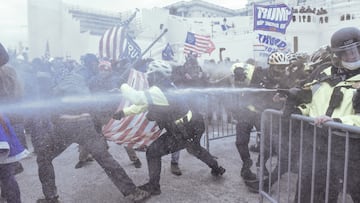What does the Supreme Court decision on January 6 charges mean for Donald Trump?
The Supreme Court decision on Friday limits federal obstruction law which has been used against many Capitol riot defendants including Trump.

Over 1,400 people have been charged for their participation in the January 6, 2021 assault on the Capitol. Hundreds of defendants have been charged with obstruction related to infamous day, including former President Donald Trump. A charge which can add a maximum of 20 years onto a sentence.
However, on Friday, the Supreme Court handed down a 6-3 decision limiting the scope of the law. Prosecutors must prove that those who are charged with obstruction in the Capitol riot tried to tamper with or destroy documents. This means those defendants could have their cases reviewed, as well as those who have been convicted and sentenced.
Trump, who has said that he would pardon the January 6th rioters who tried to stop the Electoral Count in 2021 called the decision a “BIG WIN!” on Truth Social, his social media platform. He is facing two charges based on the obstruction law in the January 6 case brought against him by special counsel Jack Smith in Washington DC. So how will this affect the former President who is also the Republican presumptive nominee for 2024?
What does the Supreme Court decision on January 6 charges mean for Donald Trump?
Prosecutors have been reinforcing their cases against those charged with obstruction offenses in the Capitol riots with evidence showing that the electoral vote boxes had to be spirited away from the assailants before they entered the congressional chambers. In the January 6 case of Special counsel Jack Smith in DC, the charges against Trump are based on the conspiracy which created a list of fake electors, sent to Washington DC, to replace the valid ones from seven swing states where Trump lost to Biden.
The decision from the Supreme Court doesn’t directly address those charges but indicates that the scheme could fall under the purview of material tampering with documents. In the majority ruling, Chief Justice John Roberts wrote, “by creating false evidence – rather than altering incriminating evidence” the obstruction statute would have been violated.
All eyes though will be on the long-awaited decision about Trump’s presidential immunity, which the Supreme Court has been sitting on releasing. That decision is expected to come out on Monday 1 July, which Trump is hoping will give him blanket immunity for his efforts to overturn the legitimate results of the 2020 election.
Even if he doesn’t get sweeping immunity from the decision, it is very unlikely that he will be tried in that case before voters go to the ballot booth on 5 November to decide who the next US president will be. The long-delayed ruling has helped Trump in running out the clock. Should he win, he may never be tried as he could force the Justice Department to dismiss the case.






